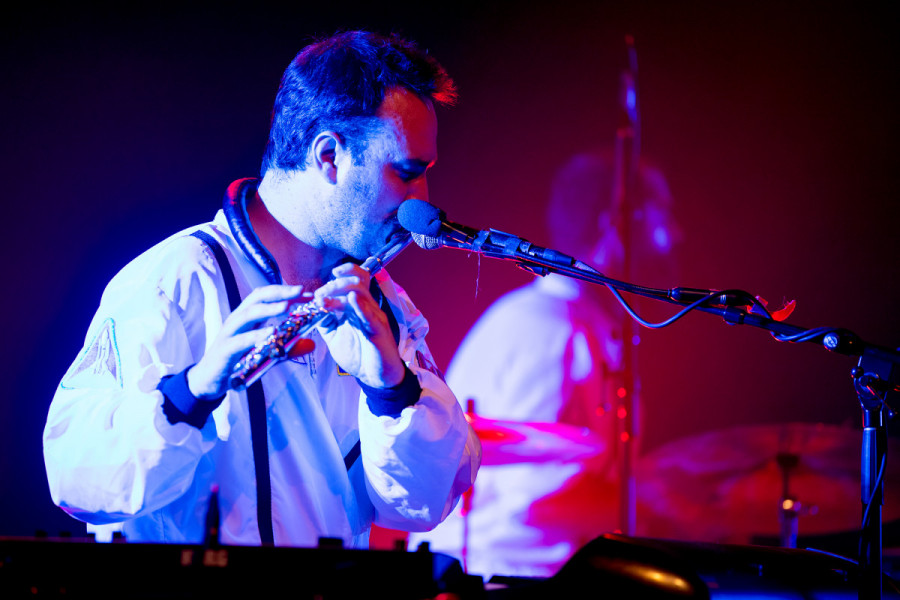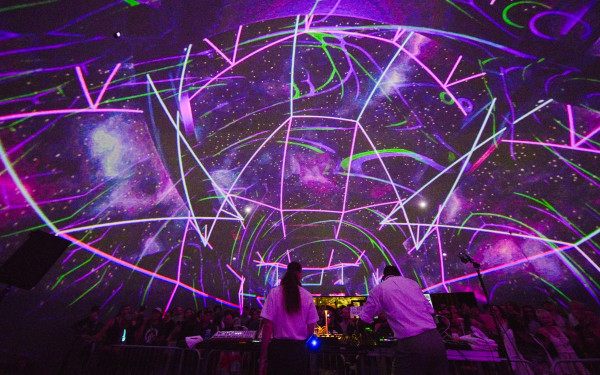Tunes from the moon
Les Moontunes met in middle school and quickly formed a magic formula of heavy grooves, galactic ambience and blistering metal
Ten years ago, Les Moontunes were just a group of high school kids watching live YouTube concerts together in a living room. Last summer, they found themselves in front of thousands, playing back-to-back shows in Montreal and St-Tite, Quebec.
It was 2015 when the band played their first show—and, by necessity, they came up with their name the night before the gig. Dubbed Les Moontunes, the seven-piece Acadian ensemble developed a sound where “intuition is the main leader of what's going on,” in the words of drummer Martin Daigle.
“The first show we played, the chord progression must have been the same the entire show,” Daigle remembers. It was a simple D minor-E minor-F major-G major sequence.
“But the vibe was really strong,” he adds.
The music is more technical 10 years later, but that vibe is still solid. Winners of the 2024 Music NB Innovator of the Year award, the band have carved out their place in eastern Canada’s music scene. Their single “Paper Boat” also netted them the 2021 Music NB Awards for Breakthrough Artist of the Year and Video of the Year.
Les Moontunes are genre-blurring. They’re jazzy but not flashy; unbridled but non-effusive; kaleidoscopic, rhythm-heavy and sometimes brassy, but with the grit of rock and a kick of metal.
Their 2024 sophomore album Elephant Wizard—less hip-hop, less jazzy, more fuzzed-out-guitar-frenzied and more anglophone than their eponymous 2021 debut album—blossomed from ‘70s sci-fi films and a chainsaw threat from a neighbour.
“We were practicing,” Daigle says, “and then the neighbour called to tell us to stop, and he said that he would come up here with his chainsaw.”
Naturally, they turned the experience into inspiration for the villain figure in Elephant Wizard, a concept album following a mystical elephant on the run from an ivory-poacher-mayor. The neighbour—excuse me, mayor—tranquillizes the elephant to steal his tusks.
Maybe the tusks have a power of some kind, or maybe they’re just shiny—each band member has their own rough idea of the story. Droning, spacey, wordless “Midnight Magic” comes in when the elephant is tranquillized; it’s followed by the frenetic, percussion-heavy “Gallop in the Jungle.”
“He wakes up and then the mayor is trying to rip off his tusk with a chainsaw,” Daigle says matter-of-factly, “and then he runs away, and then he just spends most of his time fleeing this area trying to find Planet Metal.”
Supposedly, Planet Metal is a sacred land that is safe for elephants, but things become clearer, and less utopic, when the elephant finally reaches the planet.
“The air was thick with smog, rivers ran with filth and sludge, the trees were grey and bland, and the home of the elephant was not as he recalled,” sings singer-pianist and chief songwriter Miguel Dumaine in “Planet Metal,” the third-to-last song on the album.

Coming from a group of Acadians, the connection between the elephant wizard’s journey and the 1755 British deportation of Acadians is almost too obvious. But Daigle says that was never a conscious decision.
“Sometimes it's liberating to just write something fictional and not try to find a deep meaning,” adds Jeremie Poitras, the band’s saxophone, synthesizer and bass player.
Self-described “groovy cosmonauts,” the band met in middle school in Moncton’s Francophone neighbour, Dieppe—a city of less than 30,000. They began jamming together in high school.
“It was just more in a setting where it was like, this person and this person can come play music,” Dumaine says. “We just pretty much just improvised jam sessions, just improvisation all night.”
The band prefers playing in smaller towns, especially in Quebec. They’ll be heading to Saint-Hyacinthe and Chicoutimi in April—small cities, though each with roughly double the population of Dieppe still.
“People show up, they don't know you, but they just come and they see it,” Poitras says. “There's something about going out to a smaller city, that people are always super hyped.”
Poitras explains that they’re a live band more than a studio band. Daigle agrees—then goes on to describe “little funny things” that happen at shows, like when he hit Dumaine in the side of the face with a piece of a cymbal by accident.
“I played a cymbal and then a chunk of it flew and hit him,” Daigle remembers. “And then he looks at me, and I'm trying to read him. I'm like, did he like what I just did? Or did he not like what I just did?”
“After the show, he's like, ‘No man, you hit me in the side of the head with your friggin drumstick,’” Poitras laughs.
The band performs in matching white spacesuits. In July, they played under heavy rainfall at Montreal’s Jazz Festival—where André 3000, Norah Jones and Orville Peck were on the bill. During the performance of the last song on Elephant Wizard—“Dorian Sunrise,” a wistful-yet-breezy tune about dancing in the sunshine, drinking wine and beer—Dumaine sang a slightly adapted “Dorian Rainfall.”
“People [were] dancing in the rain and it was really cool to see,” Poitras says.

“Yeah, [they were] like, ‘I don't care if I get drenched. This is where I want to be,’” Daigle adds. “[It’s] so, so cool to see that.”
If their debut album is more Pink Floyd, Elephant Wizard is more Black Sabbath, says Daigle. Their third album, scheduled to be released in the winter of next year, looks to take that metal sound even further. But no matter how much they amp up the metal, they’ll still have that soulful, jazzy feel of the piano and brass.
The ensemble has certainly shifted away from a traditional Acadian sound—they rarely sing in French; they stay away from foot percussion and the fiddle. It’s something the band has discussed extensively, but just the fact that they’re Acadian, says Poritras, makes Les Moontunes an Acadian band.
“I hope that what we're doing is kind of fun for people to be like, ‘Oh, I don't have to play according to the previous rules since I’m from this area,’” Daigle adds.
He says it’s the seven-member group—with Monica Ouellette, Patrick Gaudet, Samuel Frenette and Marc-Andre Richard besides Dumaine, Poitras and himself—that creates their ever-expanding, ever-evolving sound.
“All of our musical interests kind of merge into this thing that we can agree on,” Daigle says. “It's fun because it's like, Acadian contemporary music can be anything.”
As the band works on the next album, that “anything” is leaning toward something more weighty and rhythmical.
“Potentially something about robots taking over the world,” Dumaine hints.
This is a band that does not orbit others, or even themselves: they’re decked out in white spacesuits, pushing past their own sonic palette, toward something a bit heavier, a bit more metal and a bit dystopian.
Whether Les Moontunes are headed to the moon or beyond, the spotlight will surely find them.
This article originally appeared in Volume 45, Issue 10, published March 4, 2025.






_1_600_375_90_s_c1.jpg)
